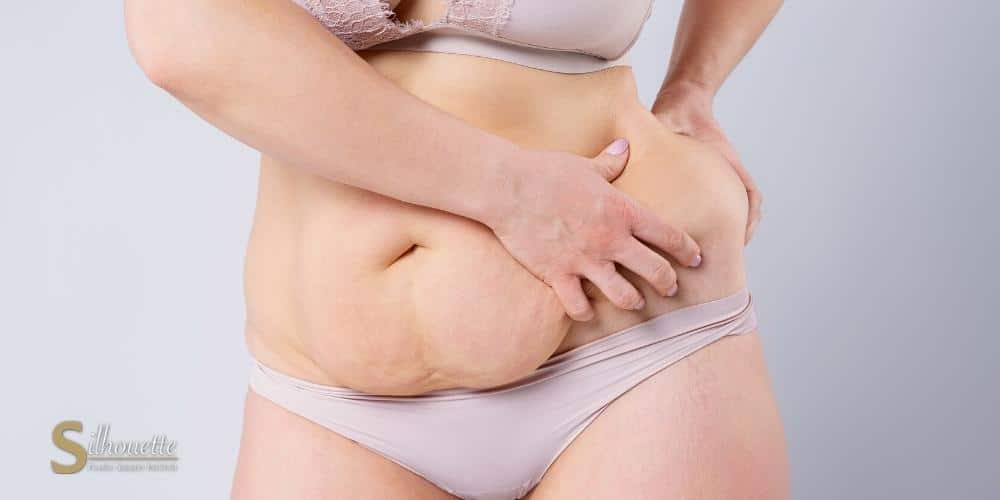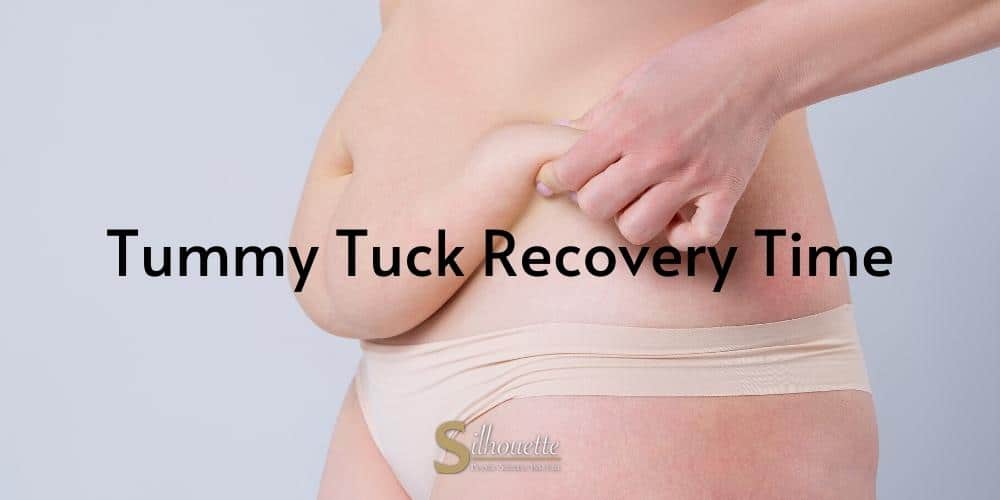Maybe you’re considering a tummy tuck in order to feel more confident in your body, but you’re unsure about whether to actually do it because you know nothing about the healing process. Tummy tuck recovery is often tough, but with the right plastic surgeon and follow up care, you can resume your normal activities in no time.
Board-certified plastic surgeon Dr. Daneshmand understands patient hesitation when it comes to major surgeries like this. That’s why he has put together the ultimate tummy tuck recovery guide that explains how to care for yourself, how long you should wait to go back to work, when you’ll see your final tummy tuck results, and so much more. Call 949-359-8397 to schedule an appointment at Silhouette Plastic Surgery Institute.
What is a Tummy Tuck?
A tummy tuck procedure, also known as an abdominoplasty, removes sagging skin and fat from the abdomen.
Types of Tummy Tucks
There are multiple types of abdominoplasty procedures, including:
- Mini Tummy Tuck: A mini tummy tuck only removes excess fat and skin from the lower abdomen. In this type of surgical procedure, the tummy tuck scar is fairly small (between 4 to 8 inches) and the surgeon doesn’t have to remove the belly button.
- Full Tummy Tuck: A full tummy tuck removes excess skin and fat from the entire abdomen. The tummy tuck scar is generally large – extending from one hip to the other – and the surgeon has to remove and reposition the belly button.
- Extended Tummy Tuck: An extended tummy tuck targets the entire abdominal area, including the waist and love handles. This is a huge surgery that’s often reserved for patients who have experienced significant weight loss.
Your tummy tuck recovery process will greatly depend on the type of tummy tuck procedure you undergo. Generally speaking, mini tummy tuck patients often experience the easiest recovery while extended tummy tuck patients experience the most brutal recovery.
Common Reasons Why People Undergo Tummy Tuck Surgery
People may undergo tummy tuck surgery to remove:
- Excess fat and skin from a previous pregnancy
- Excess skin from a significant weight loss
- Stretch marks from a previous pregnancy or weight fluctuation
- Excess abdominal fat that doesn’t respond to a healthy diet and strenuous exercise
- Excess fat and skin that developed as a result of the natural aging process

Recovery Time for Tummy Tuck
As previously stated, your tummy tuck recovery timeline is certainly going to vary depending on the type of tummy tuck procedure you endured. Additionally, it’s important to remember that every body, every person’s pain tolerance, and every person’s reaction to surgery is different. If your close friend went through a full tummy tuck and had a pretty easy healing process with absolutely no complications, please don’t expect your experience to be the same.
Below, board-certified plastic surgeon Dr. Daneshmand at Silhouette Plastic Surgery Institute has put together an extensive tummy tuck guide for recovery. He’ll discuss how long the recovery period may be, post-surgery care, and what to expect from tummy tuck recovery day by day.
How Long is Tummy Tuck Recovery?
Most patients recover from a tummy tuck in about six weeks. If you had a mini tummy tuck, that recovery time may be shorter. If you had a full or extended tummy tuck, that recovery time may be longer. Additionally, patients who experience complications from their cosmetic procedure can expect a longer recovery time. In order to keep your tummy tuck recovery as short and sweet as possible, it’s crucial that you have an experienced plastic surgeon – like Dr. Daneshmand – perform your surgery and that you listen to your surgeon’s post-op instructions.
While 6 weeks is the average recovery time for most patients, it’s important to remember that you may not see your full results until up to three months post surgery because of swelling. As swelling continues to go down over the course of several months, you will gradually see your new tummy become flatter and more attractive.
Post Surgery Care
In order to recover from a tummy tuck as quickly and painlessly as possible, you must follow your surgeon’s instructions.
Medications
Firstly, you’ll be in pain for several weeks. So your doctor will prescribe you pain medications to take on a daily basis in order to make healing more comfortable. Do not overdose on the pain medication that your doctor gives you. If you find that it’s not strong enough, contact your doctor and ask for something else. You may also have to take antibiotics and anticoagulants. Be sure to follow your doctor’s orders on those medications too. You don’t want to create any major side effects or complications.
A common side effect of both surgery and pain medications is constipation. If you’re a few days post-op and struggling to have a bowel movement, do not strain, or you could hurt yourself. In order to get your bowels moving again, you could increase your water and fiber intake or ask your surgeon for advice.
Abdominal Support Garment
You will likely wake up from surgery and notice that you’re wearing a compression garment (AKA: an abdominal binder). Compression garments are designed to reduce swelling and fluid buildup. Your surgeon will ask you to wear it for 4 to 6 weeks.
Incision and Drainage Tubes
You will also wake up and notice that you have surgical dressing on your incision site and that you have drainage tubes. The drainage tubes also help reduce inflammation because they drain excess fluid. You will likely have these tubes for a few weeks. In that time, your surgeon will ask you to keep track of how much fluid comes out of the tubes. Additionally, your surgeon will tell you exactly how to care for your incision and drainage tubes. Most plastic surgeons instruct their patients to empty their drainage tubes every day and clean their incision site multiple times a day.
Movement
The last thing that most patients want to do after a tummy tuck is to move around. But it’s necessary in order to improve blood flow, and therefore, promote healing. You will have very limited mobility for the first few days or weeks following your surgery. You may even struggle to sit up straight because you may feel a pulling sensation in your abdominal muscles. So ask a loved one to help you walk around the house in order to get your blood flowing. Walking is the only exercise you should be doing for several weeks until your surgeon clears you for more intense movement.
What to Expect: Tummy Tuck Recovery Timeline
The biggest things you can expect during your first tummy tuck recovery week is that you will be in pain and that you will need help. Be sure to have someone drive you home from your procedure and help you move around for the first few days. If you have children, be sure to make appropriate arrangements for someone to care for them.
You may be wondering: when will I be able to resume my normal activities? Again, the answer depends on your body, your type of surgery, and how well you follow your surgeon’s post-op instructions.
When Can I Go Back to Work After a Tummy Tuck?
Most patients take up to a month off of work while they recover from their tummy tuck procedure. If you’re able to, though, you could work from home for 2 to 4 weeks until you regain some mobility.
When Can I Resume Parenting Activities After a Tummy Tuck?
Most full-time parents are able to cook, shop, and drive again within 2 to 3 weeks after their tummy tuck. Still, you will need to ask for help when it comes to carrying large items (babies, children, groceries, etc.), bending over, taking care of the dog, and even cleaning the house.
When Can I Exercise After a Tummy Tuck?
You should always wait for your surgeon to clear you for vigorous exercise, especially after a major surgery like a tummy tuck. You may be able to resume light exercise – like stretching, yoga, biking, or brisk walking – around the 6 week mark. However, you should wait until after the 7 to 10 week mark to resume strenuous exercise.
Tips for Tummy Tuck Recovery
Recovering from surgery is tough, no matter who you are. Ask your surgeon if you can implement the following recovery tips into your healing process:
- Eat a healthy, well-balanced diet (lots of fruits, vegetables, protein, carbs, and fats) in order to promote healing.
- Drink plenty of water in order to reduce swelling and keep your bowels moving.
- Take probiotics daily, but make sure to do so at least four hours after you take your antibiotic. Antibiotics are great because they kill harmful bacteria, and therefore, prevent post-op infection. However, antibiotics can cause gastrointestinal issues and vaginal flora issues because they kill all the good bacteria along with the bad bacteria. Probiotics can help with digestive and vaginal discomfort while you’re healing.
- Drink ginger tea to help with nausea and digestive discomfort.
- Use arnica gel or cream to help with wound healing, inflammation, and bruising.
What Not to Do
During your tummy tuck recovery process, you should avoid:
- Smoking or vaping
- Drinking alcohol
- Taking aspirin
- Heavy lifting (or any other vigorous exercise)
- Laying or sitting constantly (you must do minimal movement to prevent blood clots)
- Swimming
- Recovering alone, without help
For more information on specific tummy tuck recovery do’s and dont’s, contact your healthcare professional.

Tummy Tuck Surgeon in Bakersfield and Orange County
If you’re looking for the best tummy tuck results in Bakersfield, CA, look no further than Silhouette Plastic Surgery Institute. Board-certified plastic surgeon Dr. Daneshmand has more than 30 years of experience in performing all sorts of cosmetic surgery. He will be right by your side, from your initial consultation to the end of your tummy tuck recovery. Call 949-359-8397 to schedule an appointment.

